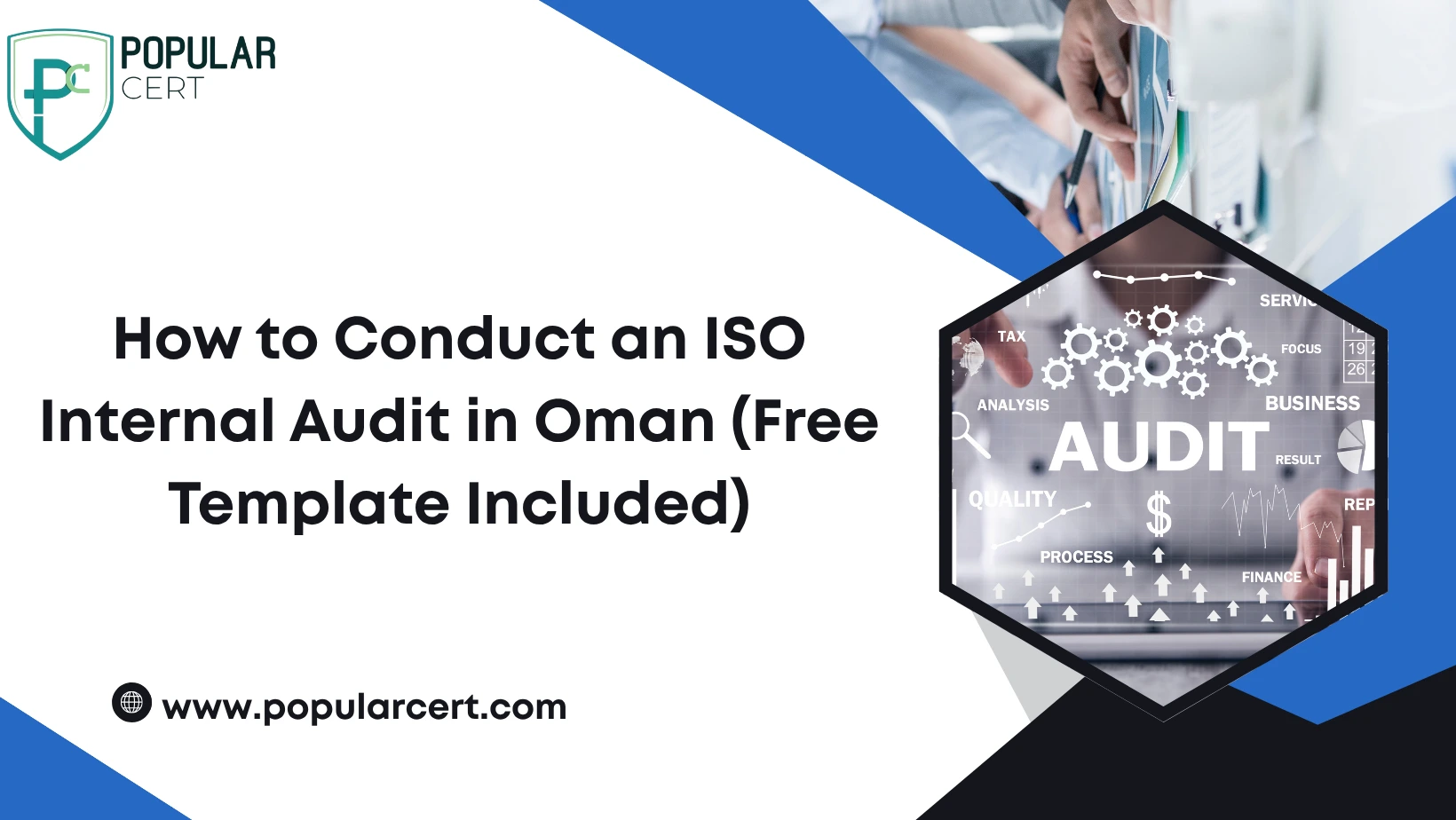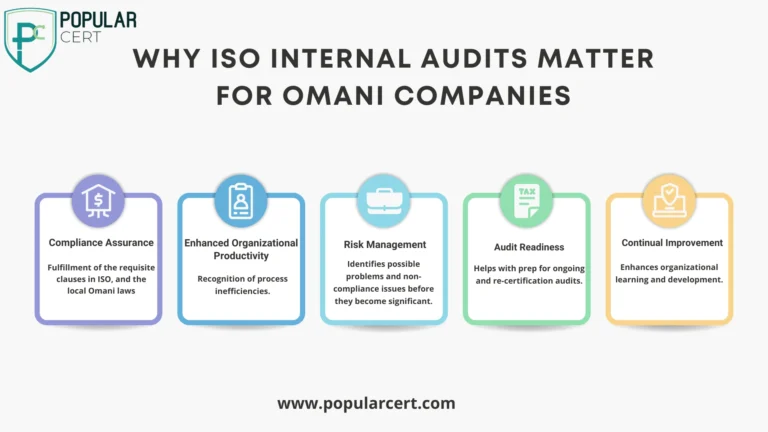How to Conduct an ISO Internal Audit in Oman (Free Template Included)

For any organization in Oman pursuing ISO certification or already certified, it will be without a doubt that internal audits will serve as a foundational element of the management system. An ISO internal audit assists organizations in determining if their processes align with ISO standards, outlining necessary compliance, areas for revision, and reviewing preparedness for external audits.
Here in this blog, we will guide you with an ISO internal audit specific to the Omani context, share a complimentary template, and demonstrate the ways in which Popularcert supports you throughout the entire process.
What Is an ISO Internal Audit?
An ISO internal audit is an independently conducted internal assessment an organization undertakes to determine if its management system:
- Meets one or more of the ISO standard requirements such as ISO 9001 or ISO 14001.
- Is efficiently executed and sustained
- Achieves the outlined quality, environmental, safety or information security goals
- Most ISO standards require this to be done such as Clause 9.2 of ISO 9001, ISO 14001 and ISO 45001.
Why ISO Internal Audits Matter for Omani Companies
Be it a manufacturing company based in Sohar, construction firms in Muscat, or food processing enterprises in Salalah, these internal audits offer immense value which include:

Regulators and clients in Oman expect sustained compliance from businesses, especially in high-risk industries such as oil and gas, food safety, logistics, healthcare, and a few more.
Step-by-Step Guide: How to Conduct an ISO Internal Audit in Oman
Now, let’s simplify the steps to make them actionable. This is relevant to ISO 9001, 14001, 22000, 45001 and other similar standards.
1. Define Audit Objectives and Scope
- Define clear metrics to gauge objectives.
- Determine which sites, departments and clauses are covered by this audit.
2. Adhere to the company audit policy and risk-based thinking
- Establish a yearly audit program with priority risks and previous audit results.
3. Create An Audit Plan And Calendar
- Assign knowledgeable auditors without conflicts of interest.
- Inform the concerned departments in advance so they can be ready.
4. Use An Audit Checklist (Download Below)
- Base it on the standards applicable, for example ISO 9001:2015.
- Add columns for audit evidence, findings and references.
- Adapt the checklist to local business and legal contexts of Oman.
5. Execute the Audit
- Open with an initial meeting
- Gather evidence via:
- Review of documents
- Interviews with personnel
- Workflow observations
- Adhere to the timeline with some adaptability
6. Capture and Categorize the Audit Outcomes
- Record instances of non-conformities, observations, and commendable practices
- Further classify the issues as minor, major, or improvement opportunities
- Make sure all findings are verifiable and substantiated
7. Develop the Internal Audit Report
- Maintain a uniform structure to the report
- Include an overview of:
- Scope, team involved, and scheduled dates
- Summary of key findings with supporting evidence
- List non-conformities alongside relevant ISO clauses
- Provide Actionable recommendations
- Convey findings in a closing meeting with the management
8. Take Action to Address Non-Conformities
- Grant responsibility for corrective actions for each non-conformity
- Perform root cause analysis (5 Whys, Fishbone, etc.)
- Document actions taken and validate completion of tasks
- Maintain evidence for future audits.
9. Perform Additional Audits as Necessary
- Re-audit critical unresolved issues
- Assess if corrective actions have been taken.
Download: Free ISO Internal Audit Template
To make the internal audit more efficient, we offer an internal audit template. The template is:
- Adjustable in both Excel and Word format
- Applicable to ISO 9001, 14001, 45001 and others.
- Contains portions for:
- Audit plan
- Checklist
- Report of findings
- Tracking of corrective actions.
No matter the industry, you can use Oman-based internal audits as a cornerstone for improvement.
Types Of Certification
- ISO Certification
- ISO 9001 Certification
- ISO 14001 Certification
- ISO 45001 Certification
- ISO 22000 Certification
- ISO 27001 Certification
- ISO 17025 Certification
- ISO 13485 Certification
- ISO 20000-1 Certification
- ISO 22301 Certification
- ISO 50001 Certification
- ISO 37001 Certification
- IATF 16949 Certification
- ISO 29001 Certification
- ISO 31000 Certification
- ISO 20121 Certification
- ISO 10002 Certification
- ISO 41001 Certification
Get Free Consultation
Our Clients


















ISO Standards That Require Internal Audits
Audits aren’t limited to ISO 9001. Below is a list of ISO Certifications where internal audits are critical:
- ISO Standard Focus Area
- ISO 9001 Quality Management
- ISO 14001 Environmental Management
- ISO 22000 Food Safety Management
- ISO 45001 Occupational Health & Safety
- ISO 27001 Information Security Management
- ISO 13485 Medical Devices QMS
- ISO 50001 Energy Management
All these standards require organizations to systematically evaluate conformity in the organization through periodic internal audits.
Common Mistakes to Avoid During Internal Audits
Even the most well-meaning audits can go wrong. Here are some common audit problems and solutions:
-
Untrained auditors:
Internal auditors should be trained. Always ensure proper fitter internal auditor allocations. -
Working solo:
Strive for independence for objective assessments. -
No documentation:
Everything must be documented for audits, their relevant traceability. -
Ignoring root causes:
Address underlying issues instead of symptoms. -
Audits as formality:
These processes should be leveraged diligently to foster organizational enhancement.
How Popularcert Supports Internal Audits in Oman
Popularcert is an ISO consultancy and auditing service provider in Oman that has been working with organizations across industries for years. Here’s how we support internal audits:
- Tailored ISO internal audit checklists for your industry and sector.
- Certified auditors offering remote or on-site audits.
- Empowering your staff through internal auditor training.
- Pre-audit and gap analysis for external audit preparedness.
- Guidance in implementing corrective actions for non-conformities.
We focus on manufacturing, construction, healthcare, IT, logistics, and food processing. Use our services to enhance your compliance culture with us and improve your audit results.
Get in touch with Popularcert for Internal Audit Assistance in Oman.
Conclusion
A well-organized internal audit process for ISO Certification purposes not only helps achieve compliance for certification but also supports your organization’s continuous improvement efforts and risk management strategies.
Utilizing the provided steps together with our free template can help achieve structure and objectivity in all internal audit cycles. If you do require professional assistance, Popularcert is available to guide you throughout the entire process.
GET A FREE CONSULTATION NOW
FAQs
Is internal auditing a prerequisite for ISO certification?
As stated in Clause 9.2 of most ISO standards, such as ISO 9001, 14001, and 45001, internal auditing is a prerequisite.
Can employees from our company perform the audit?
Yes, so long as the auditors are properly trained and sit outside their work area.
How frequently should an internal audit be conducted?
The internal audits should be conducted once a year, or more often if there are changes in risk, customer complaints, or significant organizational shifts.
Is it required to submit internal audit reports to the ISO certifying body?
No, records must be kept, but there is no requirement to submit them. Internal audit records will be assessed during certification or surveillance audits.
Can Popularcert train our employees to become internal auditors?
Certainly. We customize our ISO internal auditor training programs to the specific needs and objectives of the industry, including certification objectives.
